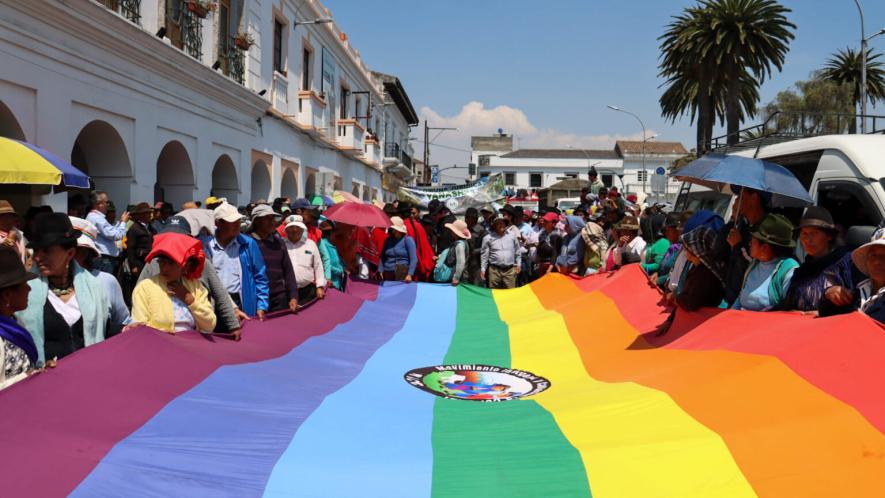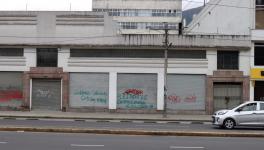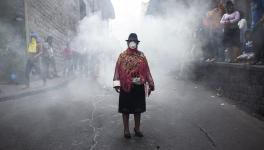Ecuador’s Noboa on Back Foot Amid Protests, Diplomatic Flops

Members of CONAIE march in Latacunga on November 15, 2024. Photo: CONAIE
On Friday, November 15, thousands of students, workers, and members of social movements and left political parties took to the streets in several cities to commemorate the “baptism of the Ecuadorian working class” and protest against the government of Daniel Noboa and his handling of the generalized crisis that the country is experiencing.
The main mobilizations took place in Quito, Cuenca, Guayaquil, and Latacunga, where the demonstrators chanted in unison “Out, Noboa, out!” or “There is no light, no education, and [Noboa] has the nerve to ask for re-election”.
In Quito, protesters marched in the direction of the Carondelet Presidential Palace from the Central University, but a couple blocks away at the Plaza de Santo Domingo, police heavily repressed the march and stopped its advance. Police detained several protesters and videos show the police dragging demonstrators, and firing rubber bullets and tear gas canisters at citizens.
For several hours, human rights organizations denounced through videos the detention of some people who could not be identified and who, according to them, were beaten by the police. The Regional Human Rights Advisory Foundation (Inredh) reported “The Ecuadorian Police refused to provide us with the identity of the persons detained. We remind you that these four people are not formally detained, so refusing to give us their identities and holding them incomunicado is a violation of human rights.”
South of Quito in the city of Latacunga, in Cotopaxi province, Ecuador’s most important social and Indigenous organization, CONAIE (Confederation of Indigenous Nationalities of Ecuador), led a massive mobilization for the working class day of remembrance and in rejection of Noboa.
CONAIE raised several concrete demands for Noboa’s administration such as ending the millionaire propaganda contracts in favor of the government and investing that money in the urgent problems of the country; to properly collect the unpaid taxes from the richest people in Ecuador (among which is the President’s own family); to make public the agreements signed by the government to face the energy crisis; to eradicate illegal mining; to ask the Army to declare its loyalty to the Constitution of the Republic; demand immediate payment so that the State institutions in charge of helping women victims of gender violence can function; and defend labor stability and respect for the price of milk.
Ahead of the mobilization, CONAIE’s President Leonidas Iza and pre-candidate for the 2025 elections, responded to criticisms that he should abandon his image as a popular leader of national protests (which shook the governments of Lenin Moreno and Guillermo Lasso) to build an image that could attract the vote of the center-left and progressive middle-class sectors. In an interview with Un Café con JJ he said that he would join the anti-government protests personally and as president of CONAIE and that raising one’s voice about injustices is not an attempt to destabilize the government. He wrote on his X account, “Today several social organizations are mobilizing to remember the 102 years of the Workers’ Massacre in Guayaquil, but also to demand the current government to act with a sense of urgency to solve the electricity, labor, social and security crises. Ecuadorians, we must be clear: In democracy, raising our voice is not destabilizing a regime.”
Baptism of the working class
On November 15, 1922, the Ecuadorian army, under orders of then President Tamayo, opened fire against a large mobilization of workers, artisans, unemployed, port workers, among others. It was never known exactly how many workers died, although the most realistic estimates put the number between 500 and 2000 killed. The badly wounded and the corpses were buried or thrown into the Guayas River.
Every November 15, the massacre that has been called “the baptism of the Ecuadorian working class” is commemorated with a demonstration. It is the day of the Ecuadorian worker.
This year, the commemoration took on more than historical significance as the working class in Ecuador faces a protracted crisis under the administration of Daniel Noboa.
Homicide rates continue to be very high (more than 5,700 deaths in 2024). Prison massacres have resumed in the Litoral Penitentiary, where prisoners do not have enough food; fuel and (consequently) food prices have risen; among other ills that Ecuadorian society is enduring.
However, what have caused the most damage to not only the president’s image, but also the economy as it has caused a rise in unemployment and a dramatic drop in production, are the nationwide blackouts that have been going on for several months. Ecuadorians are currently suffering power outages of 12 hours per day, and some experts suspect that rationing could increase to 18 hours without electricity per day.
The government has stated that the problem is due to the severe drought and the lack of preparation of previous governments. However, it seems that this official narrative is beginning to erode in a country that is desperate to end the period of darkness and increasing poverty. Indeed, the population expects solutions from a government that has decided to hide behind excuses that blame the past and the “bad luck” of a parched climate.
A government in a diplomatic crisis
For now, the panorama seems uncomfortable for the government not only in terms of internal protests but also in terms of strong diplomatic resistance. Between November 12 and 15, the XXIX Iberoamerican Summit of Heads of State and Government took place in the city of Cuenca. The government expected a large number of presidents to show the strength of the Executive. However, the Iberoamerican Summit did not have heads of state. Only two heads of state arrived in Ecuador: the King of Spain, Felipe VI, and the President of Portugal, Marcelo Rebelo with Noboa, which makes three. The Summit ended without a common agreement and four hours ahead of schedule: a complete failure, according to some experts.
It seems that the assault by Ecuadorian armed forces on the Mexican embassy, the disqualification of Jan Topic as a presidential candidate (a right-wing candidate who could have snatched Noboa’s place in the ballot), and the recent “suspension” of Veronica Abad, the elected vice-president, and the consequent unilateral designation by Noboa of the new vice-president, may have irrevocably damaged the public and diplomatic image of the Noboa government.
Even the other right-wing leaders of the region did not attend the meeting, which already indicates a kind of distancing of Noboa’s government, which now faces an escalating political crisis, an energy crisis that only seems to worsen, and an international isolation that disposes it problematically for the future.
Get the latest reports & analysis with people's perspective on Protests, movements & deep analytical videos, discussions of the current affairs in your Telegram app. Subscribe to NewsClick's Telegram channel & get Real-Time updates on stories, as they get published on our website.
















